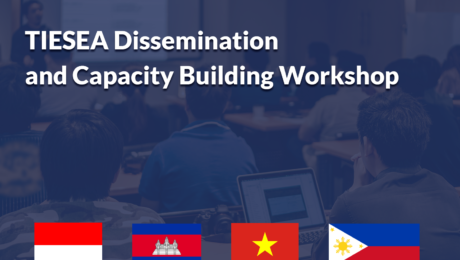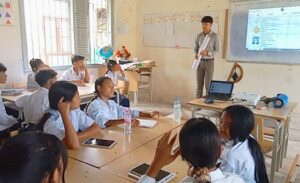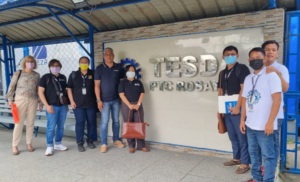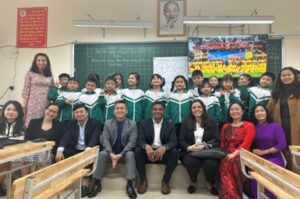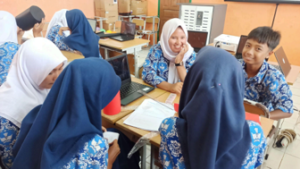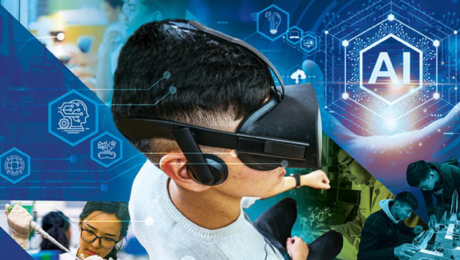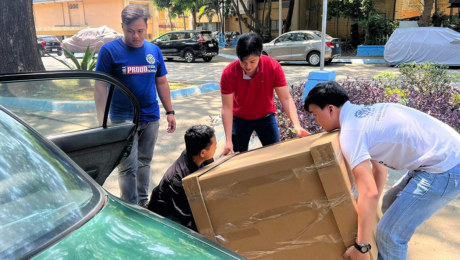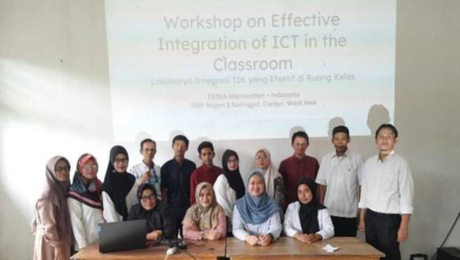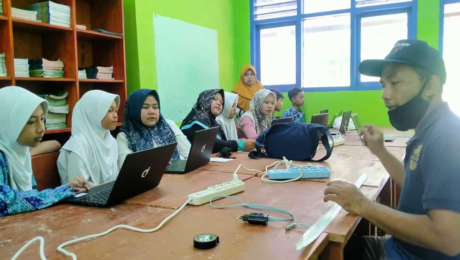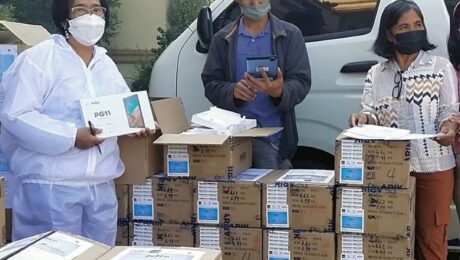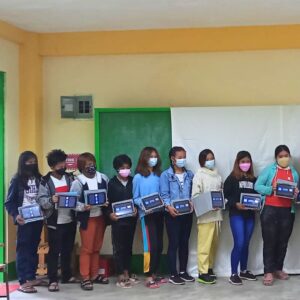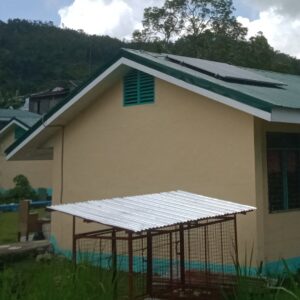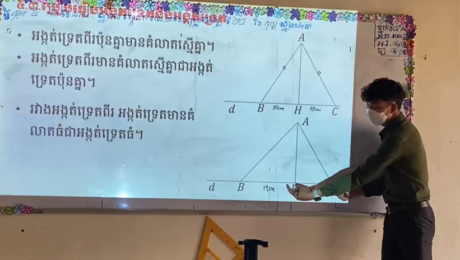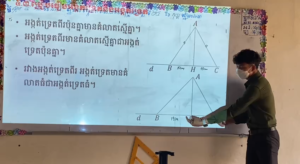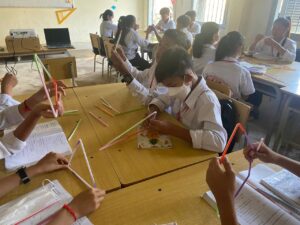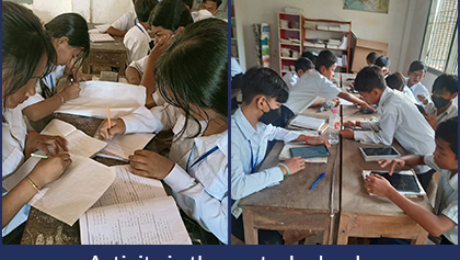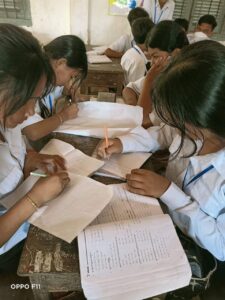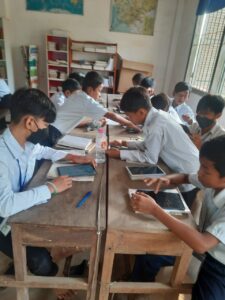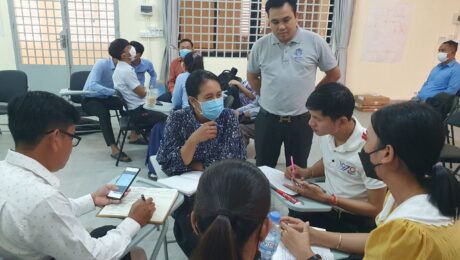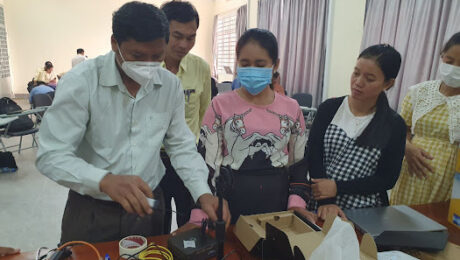Reimagine Tech-Inclusive Education: Evidence, Practices, and Road Map
As the dynamic field of education technology (EdTech) continues to revolutionize the learning process, this document explores the supporting evidence for effective digital learning, the crucial interventions and innovations in EdTech, and the optimal methods for implementing successful digital transformation endeavors in the education domain.
By illustrating how rapid technological advancements are disrupting the job market and leading to a skills gap, it presents strategies for the swift expansion of EdTech and its integration into national education agendas. Elaborating on how EdTech is already driving a shift from teacher-centered learning, the document provides tools to assess readiness for digital education and emphasizes the importance of an ecosystem-based approach in transforming and reimagining the learning experience.
- Published in All Reports
TIESEA Philippines equipment delivery
TIESEA EQUIPMENT DELIVERED TO PHILIPPINE PROJECT SITES
In February, March and April 2023, the TIESEA Philippine team members had their hands full with one of the more challenging activities of the pilot project – the delivery of the project equipment to be used in the four technical training institutes (TTIs) participating in the delivery of the TESDA training program the “Photovoltaic Systems Installation NC II course. The target learners of the course are students in areas with limited or no internet infrastructure. This TESDA Training program is fast gaining acceptance in the Philippines because the country has a tropical setting. Numerous learners see the advantage of enrolling in this training program because of higher possibilities of being employed after they complete the course.
TESDA, the major project implementing arm of TIESEA. selected four (4) technical training institutions (TTIs): Rosario PTC Cavite; Pili PTC. Camarines Sur, Tagaloan RTC and the Balanginga National Agricultural School, Eastern Samar. They offer the Photovoltaic Systems Installation NC II’ course.
The delivery of the project equipment to the TESDA Headquarters and the four participating project sites took place after almost one month of careful inspection, evaluation and loading up of course software in the computer units and tablets to be used at the project sites. These equipment items are:
| Item | Quantity |
| Mobile Tablet for learners | 100 |
| Mobile tablets for eTESDA-NITESD | 25 |
| Mobile charging cart | 4 |
| Laptops for facilitators | 4 |
| Laptop for eTESDA-NITESD (will also serve as spare) | 1 |
| WiFi Router for offline test sites | 2 |
| WiFi Router for online test sites | 2 |
| m.2 Solid State Drive for MOODLE Box 128 GB | 3 |
| Wireless network content server | 3 |
| Uninterruptible Power Supply 650VA, Universal Outlet, 230V | 4 |
Another task the needed to be done carefully was packaging the equipment, particularly the fragile items. They were packaged in thick bubble wraps and thick wood boxes with strong braces to ensure that they are not destroyed by possible improper handling as well as the elements like strong rains and severe heat from the sun. It is to be noted that majority of the project sites are in islands which are quite far from the TESDA headquarters. Still in all, it was another productive and enriching experience for the eTESDA project team. They were able to gain substantial insights in handling fragile ed tech equipment as well as coordinate with contractors chosen for the delivery of the equipment.
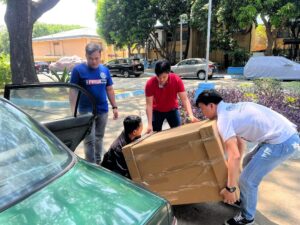
TIESEA project equipment were delivered to the TESDA national headquarters as they arrived in the county. The total time spread of the delivery was: end of February, the whole month of March up to April.
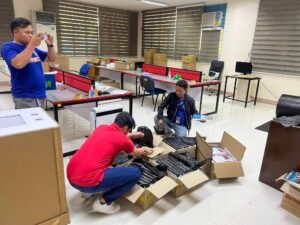
Equipment were carefully removed from the boxes and wooden crates as they are delivered on a staggered basis
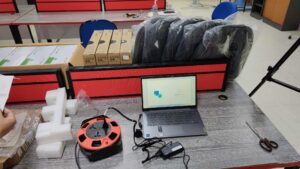
Some pieces of equipment were laid out before they were inspected and evaluated by the Etesda technical officers.
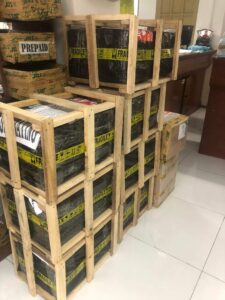
A number of equipment items were securely packaged with the use of wood and some heavy packing cardboards.
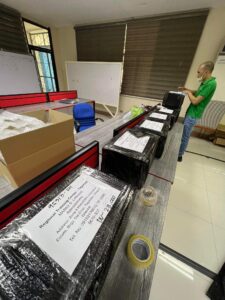
Before turning over to the delivery contractors, the equipment were carefully labeled and covered with transparent plastic to secure them from the elements.
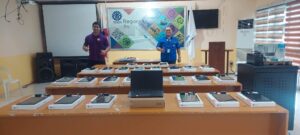
The carefully-wrapped laptops and tablets also underwent a final inspection before they were delivered to the end-user TTIs.
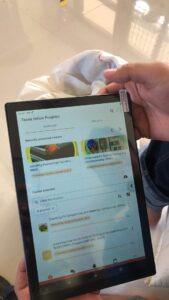
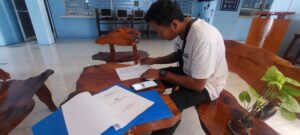
Finally, the learning devices are in the hands of a project beneficiary. A tablet, fully loaded with software and learning modules, are held gently by a learner… and is used with high interest and enthusiasm. Looking at this learner, filled with curiosity and eagerness, makes the project team feel that it was worth all the wait and effort, to at last offer this learning opportunity to the “hard to reach and unreached youth” in the Philippines.
- Published in Philippines Polit Interventions
Workshop on Effective Integration of ICT in the Classroom
The integration of Information and Communication Technology (ICT) in the classroom is not limited to urban areas, but it is also important in rural areas. However, teachers in rural face unique challenges when integrating ICT into their teaching practice due to factors such as limited infrastructure, lack of access to resources, and limited technology literacy among students and teachers. A workshop on “Effective Integration of ICT in the Classroom” in rural areas has been designed under the Indonesia intervention and conducted to address this issue. The workshop was carried out on 3-6 April 2023 and aimed to equip teachers in rural areas with the necessary knowledge, skills, and resources to effectively integrate ICT tools and resources into their teaching practice.
The workshop aimed to introduce teachers to various ICT tools and resources available for classroom use, demonstrate how to effectively integrate ICT in lesson planning and delivery, and provide hands-on experience with various ICT tools and resources.
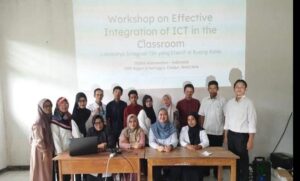

- Published in All Reports, Indonesia All Reports, Indonesia Pilot Interventions
Launch of the Intervention in Indonesia and Delivery of the Equipment
The pilot intervention in Indonesia is designed to provide capacity building for teachers to develop their digital literacy by introducing the Merdeka Mengajar platform and teaching STEM using technology within a minimal internet connectivity area. It includes a series of capacity-building workshops, learning materials development, pilot testing, and reporting. It is expected that this intervention will ensure the readiness of teachers to implement the Merdeka Curriculum.
Naringgul village has been selected randomly from the group of low socioeconomic, lack of internet connectivity but highly populated area in Indonesia. The junior high schools selected for the intervention are four schools in Naringgul village under the District of Cianjur – West Java, Indonesia. For the TIESEA intervention, 4 schools are selected randomly: SMPN 3, 6, 8, and SMPN 9 Naringgul.
In order to start the intervention, the requirement equipment was procured and then installed in March 2023. Each of the 4 targeted schools received 20 ARM-based technology laptops. Besides laptops, other hardware was delivered and installed to set up a computer laboratory, such as LCD projectors, portable sound systems, charging carts, UPS, and other electrical and lighting equipment. A digital library was also set up with the help of our partner SEAMOLEC technical team.
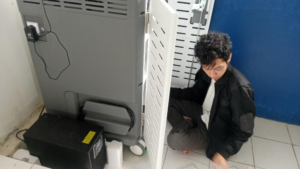 |
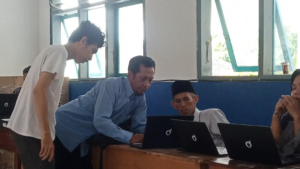 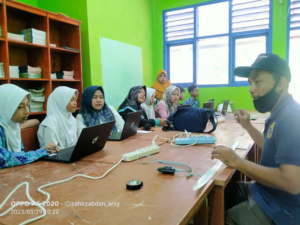 |
Caption: Inspection and installation of the equipment delivered in Naringgul schools, Cianjur, West Java, Indonesia, on 28-30 March 2023.
- Published in All Reports, Indonesia All Reports, Indonesia Pilot Interventions
Koh Khsach Tunlea Lower Secondary School
|
||||||||
|
- Published in All Reports, Cambodia All Reports, Cambodia Pilot Interventions
Activity in the control schools
|
||||||||||
|
- Published in All Reports, Cambodia All Reports, Cambodia Pilot Interventions
Teaching with technology
Teachers become familiar with the tabs that will be used by their students and experience approaches to teaching effectively with technology.
- Published in Cambodia All Reports, Cambodia Pilot Interventions
Mastering the devices
Teachers learn how to power up the offline content servers, download and upload STEM content. They are also introduced to the tabs and projectors supplied by the project.
- Published in Cambodia All Reports, Cambodia Pilot Interventions
- 1
- 2
